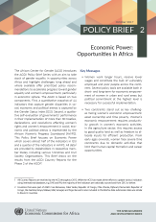Policy Brief 2 - Economic Power: Opportunities in Africa

The African Center for Gender (ACG) introduces the AGDI Policy Brief Series with an aim to take stock of gender equality in opportunities across Africa and highlight challenges lying ahead and where available offer prioritized policy recommendations to accelerate progress toward gender equality and women’s empowerment, particularly in economic sphere. The AGDI is based on two components. First, a quantitative snapshot of 44 indicators that capture gender disparities in social, economic and political arenas is captured by the Gender Status Index (GSI). Second, a qualitative self-evaluation of governments’ performance in their implementation of more than 30 treaties, declarations, and resolutions affecting women’s rights and women’s empowerment in social, economic and political arenas is represented by the African Women’s Progress Scoreboard (AWPS). This Policy Brief focuses on Economic Power which covers almost half of the indicators in GSI and a quarter of the indicators in AWPS. All data1 are provided by stakeholders in respective member States, including various Ministries and Civil Society Organizations. This Brief draws on the results from the AGDI Country Reports for the Phase 2 of the AGDI.
Key Messages
- Women work longer hours, receive lower wages and constitute the bulk of vulnerably employed and poor people across the continent. Several policy tools are available both in short- and long-term for economic empowerment of women in urban and rural areas but political commitment at the highest level is necessary for successful implementation.
- Two constraints stand out as key challenges facing women’s economic empowerment: asset ownership and time poverty. Women’s economic empowerment requires productivity growth in women’s economic activities. In the agriculture sector, this requires access to good quality land as well as freedom to allocate inputs for efficient production. From early ages onwards, women face severe time constraints due to domestic activities that limit their human capital formation and career opportunities.